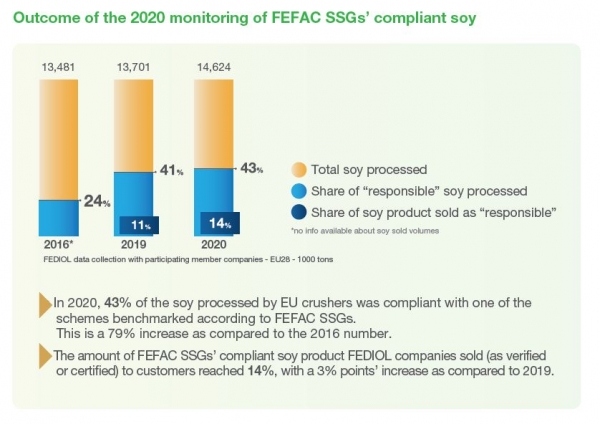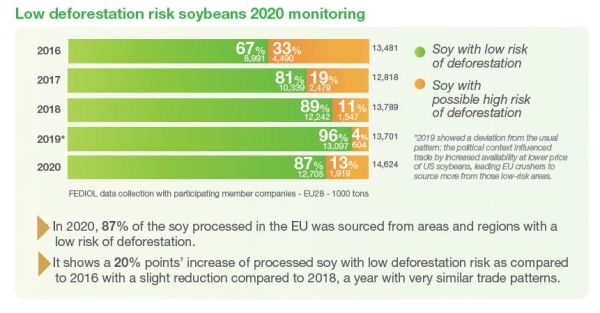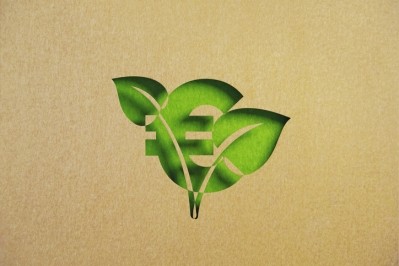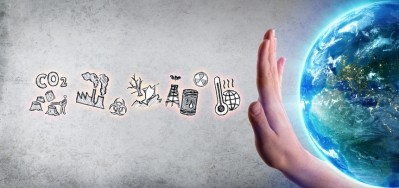FEDIOL: Limited customer uptake of soy meeting sustainability criteria
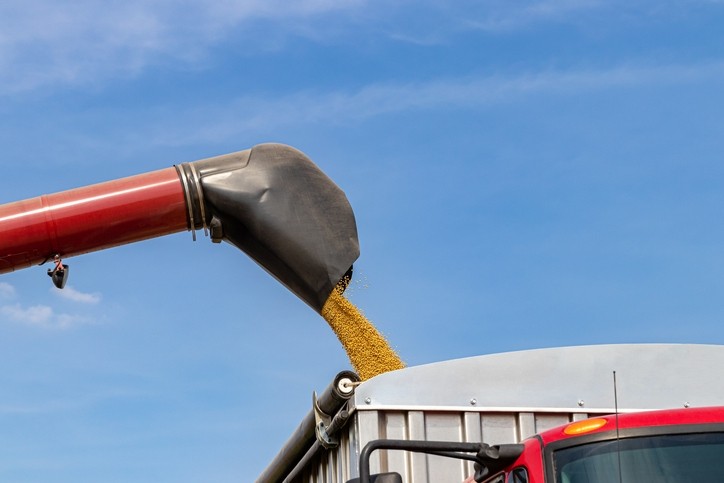
That organization, which represents the interests of the European vegetable oil and protein meal industry, has just released a report monitoring responsible soy up to 2020.
The publication evaluated the volumes of soybeans that were compliant with the older set of FEFAC Soy Sourcing Guidelines (SSGs) and that were bought and sold as meal or oil in the EU by FEDIOL member companies.
The monitoring shows that 43% of the soy processed in 2020 was compliant with one of the schemes benchmarked according to the FEFAC SSGs. This is a 79% increase as compared to the 2016 volume, said the representative body.
The amount of FEFAC SSGs’ compliant soy product that FEDIOL companies were able to sell as verified or certified in 2020 reached 14%. “While this is a 3% points increase as compared to 2019, it still confirms the considerable 30% points gap between what FEDIOL companies bought and processed and what they actually sold as verified or certified, due to the limited customers’ uptake of soy meeting sustainability criteria.”
With the vast majority of buyers not prepared to pay a premium, the crushers sell the product as ‘standard’ although it is ‘verified or certified’. “So they themselves have to support the premium paid for the soybeans to their suppliers.”
When asked how this pertinent issue can be tackled, Nathalie Lecocq, director general of FEDIOL told FeedNavigator:
"Addressing deforestation in our supply chains is a shared responsibility which needs to be understood and supported by all players, from users of commodities to consumers.
"It requires talking about why an operator or manufacturer uses sustainable commodities in their production processes and the importance that this has for financing the transition to more sustainable practices.
"There is need to understand that it takes effort to change practices, starting at the farmer level, setting up sustainable chains, monitoring and verifying production conditions, etc., and, in the end, efforts need to be valued and compensated."
Low and high-risk deforestation risk soybeans
FEDIOL also assessed the geographical sourcing of soybeans from its member companies and the collection of their aggregated volumes of soybeans processed in the EU, with a view to reporting on the volumes of low and high deforestation-risk soybeans entering the EU market.
The assessment concludes that 87% of the soybeans processed in the EU in 2020 was sourced from regions with a low risk of deforestation, representing a 20% points increase as compared to 2016. But 13% of soybean volumes are still sourced from high-risk regions.
The organization noted that further efforts are being deployed to ensure soybean production is not linked to the destruction of forests or savannahs. "The key soy players have worked on enhancing traceability, increasing scrutiny, engagement with farmers to change practices, towards producing more without land conversion."
Soybean sourcing
FEDIOL said it assessed the soybean sourcing of member companies based on their geographical knowledge of the origin of their supplies and the collection of their aggregated volumes of soy processed in the EU.
"For the purpose of this assessment, soybeans associated with a low risk of deforestation - even if not all supplies may be verified or certified - cover the EU, Ukraine, USA, Canada, Brazilian soybeans under the Amazon moratorium or under valid sustainability/no-deforestation certification, and Argentina origin outside the Gran Chaco area."
For crushers, the geographical area from which to source soy is seasonal. Northern and Southern hemisphere alternate as new harvests arise. Availability and price determine the most economically viable option. Soy can be sourced from areas where the risk of deforestation is higher, in which case more efforts would be implemented to provide evidence that the supplies are not associated with deforestation, noted FEDIOL.
Energy prices hitting EU crushing and refining activity
Separately, in a letter sent to the EU Commissioner for Energy, Kadri Simson, on October 6, FEDIOL president, Jordi Costa, warned that the sharp increase in the price for natural gas is putting energy intensive sectors under additional competitive pressure, and is also jeopardizing aspirations and on-going efforts to support transformation towards more sustainable industrial practices in Europe.
"Our industries need constant energy supply at competitive prices to ensure the EU food chain is supplied with protein meals and vegetable oils. Extra-EU locations are far from facing similar pressure, which has the potential to create lasting consequences on the crushing and refining activity in Europe and trigger carbon leakage."
